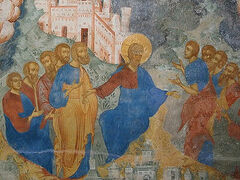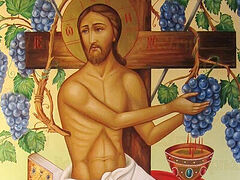About love and spiritual harmony
 Photo: lorssi.wordpress.com If anyone has not a sense of love for the Lord and amicable spiritual harmony, he must condemn himself and grieve for this, and prostrate himself in every way and pray fervently about this, entreating the Lord to vouchsafe him this gift of grace; for this gift is higher than all, above prophecy, martyrdom, and so on, as the Apostle Paul said about it (1 Cor. 13:1ff.). And how could it not be the highest? It comes from God Himself and unites with God, for God is love, thundered the great theologian and beloved friend, and he that dwelleth in love dwelleth in God, and God in him (1 Jn. 4:16). And so, whoever does not have love, let him fervently entreat it from the Lord, humbling and upbraiding himself, and let him seek it by deeds of love. Ask, and it shall be given you, says the Lord. Seek, and ye shall find (Mt. 7:7). And as prayer is given to him who prays, so the gift of love to him who tries for it with humility and prayer.
Photo: lorssi.wordpress.com If anyone has not a sense of love for the Lord and amicable spiritual harmony, he must condemn himself and grieve for this, and prostrate himself in every way and pray fervently about this, entreating the Lord to vouchsafe him this gift of grace; for this gift is higher than all, above prophecy, martyrdom, and so on, as the Apostle Paul said about it (1 Cor. 13:1ff.). And how could it not be the highest? It comes from God Himself and unites with God, for God is love, thundered the great theologian and beloved friend, and he that dwelleth in love dwelleth in God, and God in him (1 Jn. 4:16). And so, whoever does not have love, let him fervently entreat it from the Lord, humbling and upbraiding himself, and let him seek it by deeds of love. Ask, and it shall be given you, says the Lord. Seek, and ye shall find (Mt. 7:7). And as prayer is given to him who prays, so the gift of love to him who tries for it with humility and prayer.
And this petition and supplication is well pleasing to the Lord, because it is according to His will and desire. That they all may be one, says the Lord (Jn. 17:21); A new commandment I give unto you, That ye love one another; as I have loved you (Jn. 13:34). And He Who gave the commandment is powerful enough to grant help to fulfill it if only He sees in you the desire and effort for such an angelic, unified, and loving life: Because the Son of God puts even His glory into such love, and He Himself prays about it to His Divine Father: As Thou, Father, art in Me, and I in Thee, that they also may be one in us (Jn. 17:21). Further: And the glory which Thou gavest Me I have given them; that they may be one, even as We are one: I in them, and Thou in Me, that they may be made perfect in one; and that the world may know that Thou hast sent Me, and hast loved them, as Thou hast loved Me (vv. 22-23). And again: Ye are My friends, if ye do whatsoever I command you (Jn. 15:14). And what has our Lord God commanded us? Clearly, above all, the Heavenly love and oneness of soul of the inhabitants of Heaven, for He says: By this shall all men know that ye are My disciples, if ye have love one to another (Jn. 13:35). This is the blessing, truly the Apostolic gift, that is granted to all who seek it with zeal and humility. Does anyone really want to be deprived of this blessed fate through laziness, self-love, and neglect, and not only temporally, but in eternity? For without love it’s impossible to enter the Kingdom of Heaven, where God Himself is love, and all the angels and all the saints live and rejoice eternally in God and in love.
The preeminent Apostles, who were taught by the Lord, teach us that love is above all gifts, including moving mountains, raising the dead, and speaking with angelic tongues—without love there is nothing. For many who have no love will say: Lord, Lord, have we not prophesied in Thy name? and in Thy name have cast out devils? and in Thy name done many wonderful works? (Mt. 7:22). But alas, they will hear: I never knew you (v. 23, Lk. 13:25, 27)! “Because I don’t see My likeness—love—in you. Mine are those who abide in love; they are My friends and disciples, and where I am, there they will be with Me eternally, in the Kingdom of My Father.”
And if in Heaven there is nothing higher than love, for God Himself is love, then this should teach us how great is the mercy of God to those who were vouchsafed the gift of love, which is poured out from God Himself into their hearts by the Holy Spirit, as it is said: The love of God is shed abroad in our hearts by the Holy Spirit Which is given unto us (Rom. 5:5). Not to acquire, or to extinguish pure-hearted love for God is the same as losing God or departing from Him; because without love, even if you exhaust yourself from fasting and labors, even if you endure all malevolence, even if you give your body to be burned, or work all kinds of miracles, it’s all nothing and for nothing.
Love, that is, God, embraces, enlivens, enlightens, illuminates, contains, nourishes, warms, ignites, delights, and gladdens all the Heavenly powers, all the choirs of angels and archangels. What blessedness love for Jesus Christ leads us into! Otherwise, into Hell, where there is no love, but all things evil and tormenting are to be found; and those who have no love must naturally take up abode where there is no love, and eternally abide with the demons, who are the enemies of the love of God.
Holy love is embraced by the suffering of Christ, stained with His Divine blood; for for the sake of love, Christ God was pleased to suffer and shed His blood, if only to draw us to love for Himself and for each other. Moved by this love, Moses asks to be erased from the Book of Life for Israel. Enraptured by this love, St. Paul cries “anathema” for himself from Christ for the salvation of his neighbors. Will not those who despise, or don’t desire, or don’t have such love for God be guilty of the Body and Blood of the Lord? For the Lord suffered for love of mankind; and love is the nature of God, and he who is a stranger to love is a stranger to God.
So we carefully guard ourselves from bitterness and all such things that lead to ruin and cooling of harmony and amity in Christ Jesus our Lord; to Him be glory, honor, and worship, together with the Father and the Holy Spirit, now and ever and unto the ages of ages. Amen.
About humility
Is it not the greatest folly to elevate oneself with the thought that you’ve supposedly done something for God by leaving the world and everything in it and entering the monastic life for immediate service to the Lord, and thereby as if did a favor for God, bringing Him such a sacrifice? Just think: The Lord said to His Disciples: Ye have not chosen Me, but I have chosen you, and ordained you, that ye should go and bring forth fruit, and that your fruit should remain (Jn. 15:16). They, that is, the Apostles, had pure, unflattering hearts, as the Lord Himself testifies of them: Ye are clean (Jn. 13:10). And again: Behold an Israelite indeed, in whom is no guile! (Jn. 1:47). And they lived a hardworking, humble, quiet life, in poverty and simplicity, not having even a night’s rest; they fed themselves with the work of their hands, for they were fishermen. But having left and neglected all this, they followed the Lord day and night, spontaneously, inseparably, together with the people.
And having chosen such worthy ones who clung to Him with love and believed in Him, the Lord rebuked them for thinking that they themselves went following after Him, telling them: Ye have not chosen Me, but I have chosen you (Jn. 15:16). But the Lord chose such as us, who listen to worldly seduction more than Christ, so alienated and distant from Christ the Lord, wallowing in all kinds of worldly delights and sins, attentive only to rest, merriment, and all kinds of passions—unworthy ones, I say, not following after Christ, or more accurately, fleeing from Christ, and imitating those who love the world and chase after worldliness—and by His almighty providence He called us to angelic service to Himself, that is, into the monastic life. Can we think that we’ve gone to serve God? Is it not more fitting to marvel at His great mercy for us sinners, and out of gratitude humbly dedicate ourselves to the most zealous service and acts pleasing to Him, for which He, the merciful One, will again reward us a hundredfold in this life, and in the future, eternal life?
On true pleasure
Think of what a wretched state we are called from, and into what a high dignity we are called by God Himself! We are called from corruption to incorruption; from mortality to immortality; from the inglorious to the most wonderful and incomprehensible glory and splendor; from a sorrowful and arduous life into an endless, ever-abiding joy, never diminishing for even a second, but ever blooming with unfathomable delight, with eternal rest and Divine consolation! Having changed from decrepitude into strength and ageless youth, and having accepted the dignity, honor, and glorification of all the saints, perhaps you will be nourished and adorned more magnificently than angelic beauty; for it’s written: The angels desire to look into the glory of the saints (1 Pt. 1:12). Your freedom will dissolve across all the heavens, and you will approach the throne of God with boldness! You will exult and rejoice and will be refreshed in the Paradise of God. The unfathomable bliss there will not allow your mind to recall the earth that gave birth to you; because you will be in unceasing delight from the ever-flowing grace of God, seeing God Himself. Your sins will no longer be remembered, but you will shine and beam like all the righteous and those who have lived venerable lives; from a sinner, a criminal, a reviler, you will be made part of God’s fellowship, and you will no longer fear the chasms of Hades, the abyss of Tartarus, and the dungeons and torments of Gehenna.
O most wondrous love of God, which our Savior, the Lord Jesus Christ pours out upon us!
He desires to be friends with us eternally, though we are foul and wicked and so often anger Him. May we correspond to His glory, may we become sons of God and like unto God, co-heirs with our Lord Jesus Christ, His companions and cohabitants, and most sincere friends of God, enjoying all Heavenly blessings; and most of all, may our blessedness extend into endless ages.
And given such a revelation of the Heavenly blessings promised to us, we want to attain it without making any effort or correcting ourselves! But it’s not possible that a sinner, who has not labored according to his strength for the redemption of his sins, should be led into the blessedness of the sinless and righteous and be numbered amongst them. Ever bearing this in our minds and hearts, let us strive, beloved, let us strive with all our soul, that we might not be deprived of the eternal bliss that awaits us. The Lord Himself helps all who are wholeheartedly devoted to this end.
I, a feeble-minded sinner, have written this, with God’s help, not for the whole world, but for the benefit and edification of those whom my Lord and God has given me, that I may guide them and serve them as succor for their God-sanctified lives.



